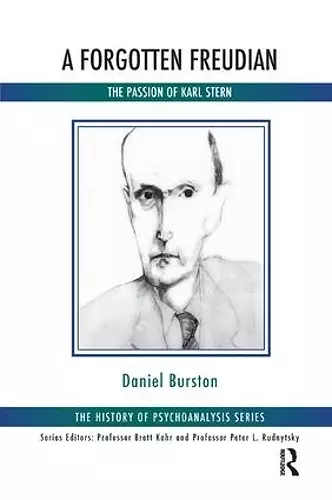A Forgotten Freudian
The Passion of Karl Stern
Format:Paperback
Publisher:Taylor & Francis Ltd
Published:25th Apr '16
Currently unavailable, and unfortunately no date known when it will be back
This paperback is available in another edition too:
- Hardback£135.00(9780367103729)

This book explores the life and work of a neglected figure in the history of psychoanalysis, Karl Stern, who brought Freudian theory and practice to Catholic (and Christian) audiences around the world.Karl Stern was a German-Jewish neurologist and psychiatrist who fled Germany in 1937 - first to London, then to Canada, where he taught at McGill University and the University of Ottawa, becoming Chief of Psychiatry at several major clinics in Ottawa and Montreal between 1952 and 1968, when he went into private practice. In 1951 he published The Pillar of Fire, a memoir that chronicled his childhood, adolescence and early adulthood, his medical and psychiatric training, his first analysis, and his serial flirtations with Jewish Orthodoxy, Marxism and Zionism - all in the midst of the galloping Nazification of Germany. It also explored the long-standing inner-conflicts that preceded Stern's conversion to Catholicism in 1943. The Pillar of Fire was a run-away best seller, and was followed by a series of remarkable books and papers that recommend Freud (and psychoanalysis generally) to Christian audiences, including The Third Revolution (1954), The Flight from Woman (1965) and Love and Success (1975). Stern firmly believed in the compatibility of science and faith, and was a star of the Catholic lecture circuit, where he often spoke about the evils of anti-Semitism. His friendship and correspondence with Thomas Merton, psychiatrist/psychoanalyst Gregory Zilboorg, philosophers Jacques Maritain and Gabriel Marcel, activist Dorothy Day and novelist Graham Greene (among others) shed considerable light on Catholic intellectual life in the Cold War era, and the difficulties facing Stern, whose simultaneous efforts to combat Christian anti-Semitism and to integrate Freudian thought into the core of Catholic philosophy met with mixed results.
'Karl Stern (1906-1975) was a complicated and fascinating figure, resurrected here from near invisibility by Daniel Burston's meticulous biography. Stern, a "Hebrew Catholic" born and educated in Germany, came to practice psychiatry in Canada in 1939, where he also displayed his talents as a best-selling non-fiction author, novelist, and skilled musician. Stern, like his cohort of Jewish converts, offers scholars of religion and the social sciences a study of hybrid identity, parental conflict, friendship, loss, religious conversion, and psychoanalytic debates, set against the backdrop of the signal movements and events of the twentieth century. Stern's friendships and correspondence with prominent Catholics of the era, including Dorothy Day, Graham Greene, Gabriel Marcel, and Jacques Maritain are well-served in Burston's perceptive treatment.'- Paula Kane, Professor of Religious Studies and Marous Chair of Contemporary Catholic Studies, University of Pittsburgh'With his characteristic eloquence and subtlety of analysis, Daniel Burston describes the rise, struggles, and remarkable accomplishments of Karl Stern, a key figure of mid-twentieth-century psychoanalysis who deserves to be remembered for his central contributions to the understanding of culture and the psyche. Burston's gripping account sheds welcome new light on the history of both psychiatry and psychoanalysis. A fine, heartfelt, moving work of intellectual biography and cultural history.'- Louis Sass, author of Madness and Modernism and The Paradoxes of Delusion'Drawing on Duquesne University's rich archive of published and unpublished fictional and epistolary material, Daniel Burston has written a compelling account of Karl Stern's personal and professional life. This biography traces his journey from Germany to Canada, from neurology to psychoanalysis, from troubled Judaism to committed Catholicism. Stern's spiritual experience is given particular attention and contextualized geographically, historically, and philosophically as he struggled to resolve the tensions between science and religion, between his European Jewish roots and his particular understanding of Catholicism in the post-World War II world. Burston pays a worthy tribute to this forgotten Freudian.'- Dr Caroline Zilboorg, Life Member, Clare Hall, University of Cambridge
ISBN: 9781782203469
Dimensions: unknown
Weight: unknown
280 pages